1. What are the methods of memory allocation in C language?
▍Technical Principles Explained
In embedded systems, the memory allocation mechanism directly affects the stability and performance of programs. C language manages memory through the following three methods:

Low-Level Mechanism Analysis:
1. Static Storage Area
- Lifecycle: Allocated at program startup, released at process termination
- Implementation Principle: Allocated by the compiler in the .data segment (initialized) or .bss segment (uninitialized)
-
int global_var; // .bss segment static int static_var = 10; // .data segment
2. Stack Allocation
x86 architecture default stack growth direction: high address → low addressARM Cortex-M uses a full descending stack (SP decreases before storing during PUSH)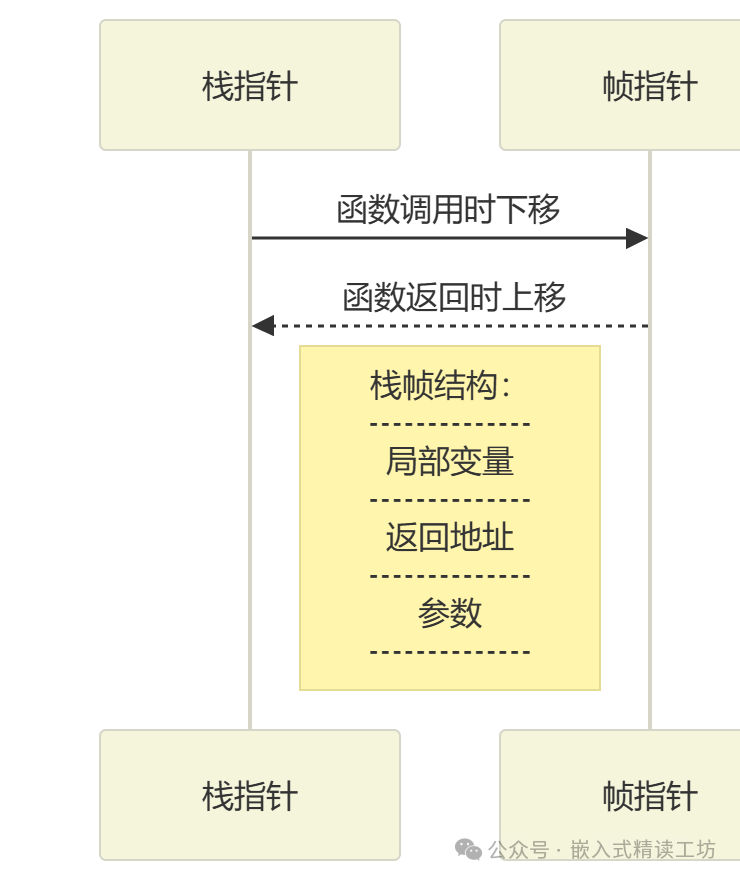
3. Heap Allocation
- Managed using algorithms like malloc
- Allocation speed is slow (requires traversing free list)
- Prone to external fragmentation
Memory Management Structure:
struct heap_chunk { size_t prev_size; // Size of previous block size_t size; // Size of current block (including flags) struct heap_chunk* fd; // Pointer to free block list struct heap_chunk* bk; };Allocation Algorithm:
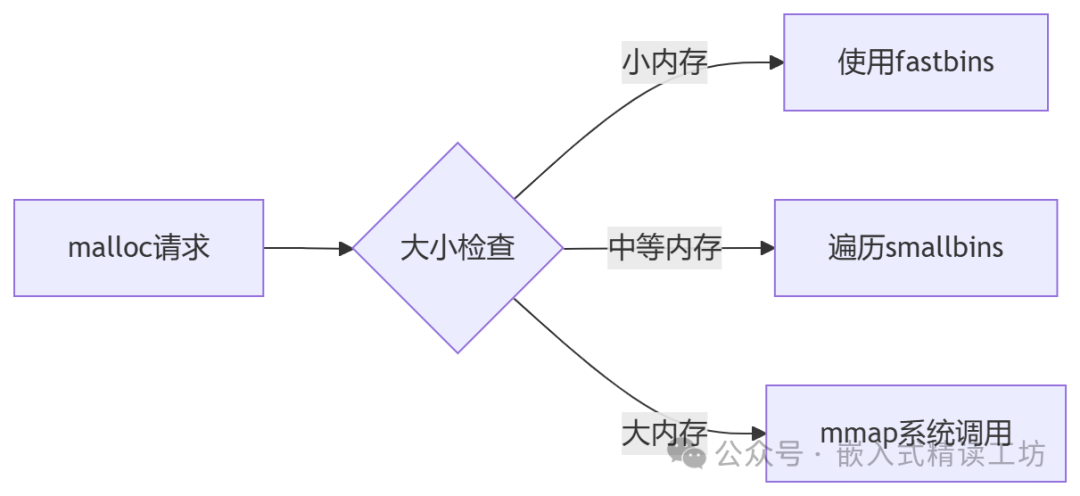
2. What are the differences between heap and stack?
▍Difference Analysis

Key Differences Explained:
| Characteristic | Stack | Heap |
|---|---|---|
| Allocation Speed | Single cycle completion (SP register operation) | Requires traversing free list (100+ cycles) |
| Fragmentation Issue | None | External fragmentation rate can exceed 30% |
| Hardware Support | Dedicated SP register | No hardware acceleration |
| Error Type | Stack Overflow | Heap Fragmentation |
| Debugging Difficulty | Easy (LR register tracking) | Difficult (requires memory analysis tools) |
Embedded Development Trap Example:
// Danger: Large array allocation leads to stack overflowvoid unsafe_func() { uint8_t buffer[2048]; // Crashes in 1KB stack environment memset(buffer, 0, sizeof(buffer));}// Correct: Use heap allocationvoid safe_func() { uint8_t *buffer = malloc(2048); if(buffer) { memset(buffer, 0, 2048); free(buffer); }}3. What is the role of the stack in C language?
▍Stack Frame Structure and Function Calls
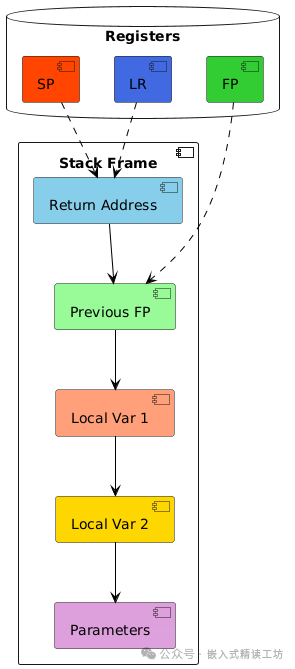
ARM Cortex-M Stack Operation Process:
1. When calling a function:
- Store parameters in R0-R3 registers (excess pushed onto stack)
- Return address automatically stored in LR register
MOVR0,#0x01; Parameter 1
MOVR1,#0x02; Parameter 2
BLtarget_func; Jump and save LR2. During function execution:
- Push to stack to save R4-R11 and other registers that need to be preserved
- Adjust stack pointer to allocate space for local variables
PUSH{R4-R7,LR}; Save registers
SUBSP,SP,#0x20; Allocate space for local variables3. When returning from the function:
- Restore saved registers
- Return via POP {PC}
ADDSP,SP,#0x20; Release local variables
POP{R4-R7,PC}; Restore registers and returnInterrupt Context Saving Mechanism:
// Cortex-M automatic stack push order
typedef struct { uint32_t r0, r1, r2, r3, r12, lr, pc, xpsr;} HardwareStackFrame;// Interrupt handling example__attribute__((naked)) void HardFault_Handler(void) { __asm__ volatile( "TST LR, #4\n" "ITE EQ\n" "MRSEQ R0, MSP\n" "MRSNE R0, PSP\n" "B HardFault_Handler_C\n" );}4. What is the order of pushing function parameters onto the stack?
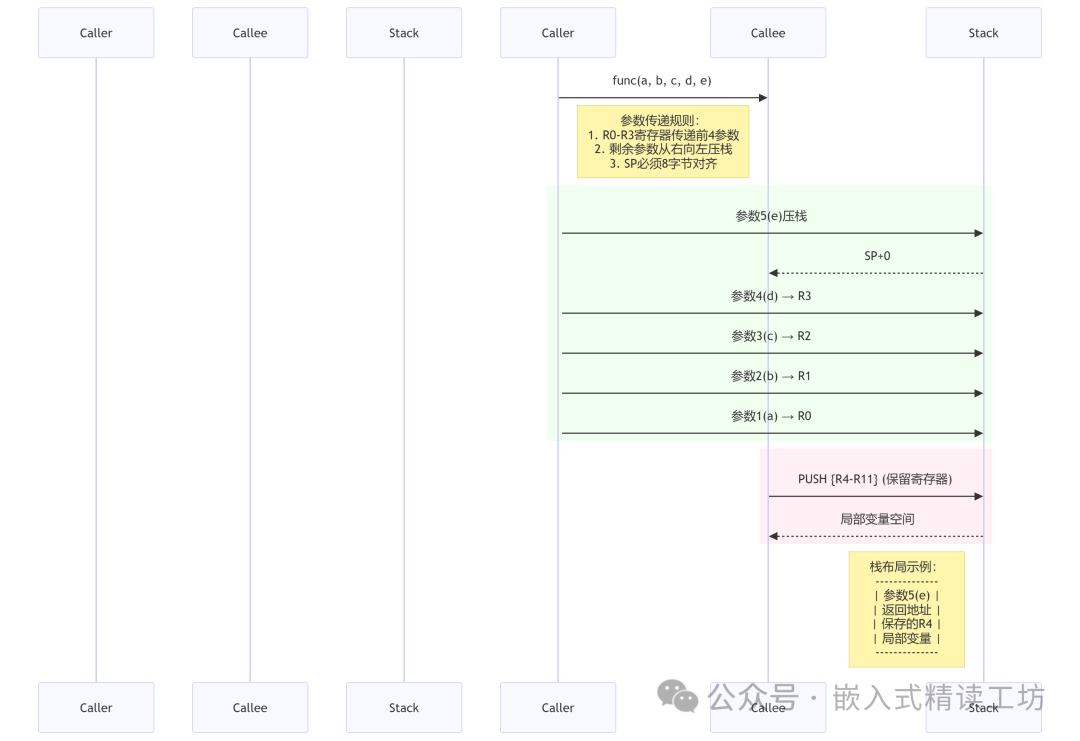
▍Technical Principles Explained
- The first four integer parameters are passed via R0-R3 registers
- The fifth parameter and beyond are passed using the stack (SP+0 offset)
- Floating-point parameters use S0-S15 registers
Stack Frame Verification Code:
void test_stack(int a, int b, int c) { printf("&a=%p &b=%p &c=%p\n", &a, &b, &c); // Output shows: &c < &b < &a (addresses decrease)}int main() { test_stack(1, 2, 3); // Trigger stack push operation}5. What are the hardware-level manifestations of memory leaks?
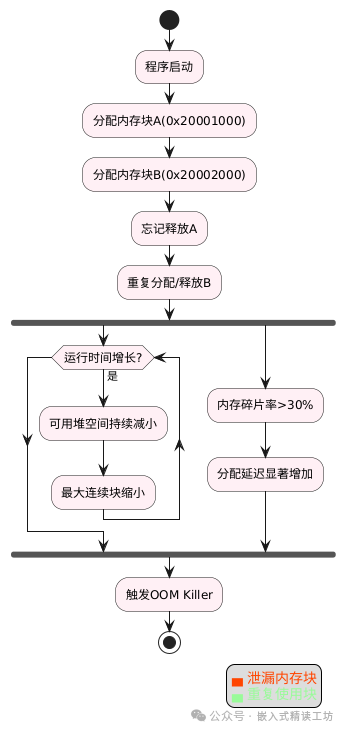
▍Technical Principles Explained
- Abnormal reduction in free list nodes of the heap manager
- Frequent expansion of heap space via _sbrk() system call
- Continuous decrease in memory fragmentation counter (mallinfo().fordblks)
Embedded Detection Code:
void mem_leak_check() { struct mallinfo mi = mallinfo(); static int last_free = 0;
if(mi.fordblks < last_free) { log_error("Memory leak! Decreased by %d bytes", last_free - mi.fordblks); } last_free = mi.fordblks;}6. What is a systematic solution for memory leak detection?
▍Implementation Plan
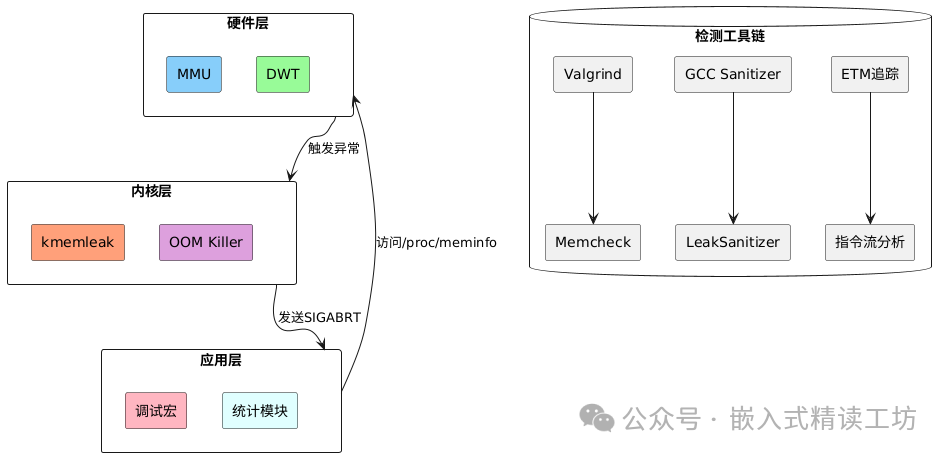
Custom Memory Debugger:
#define MEM_DEBUG#ifdef MEM_DEBUGtypedef struct { void* ptr; size_t size; const char* file; int line;} MemRecord;static MemRecord mem_table[1024];static size_t mem_usage = 0;void* debug_malloc(size_t s, const char* file, int line) { void* p = _malloc(s); if(p) { mem_table[mem_usage++] = (MemRecord){p, s, file, line}; } return p;}void dump_leaks() { for(int i=0; i<mem_usage; i++) { printf("Leak block: %p size=%d @%s:%d\n", mem_table[i].ptr, mem_table[i].size, mem_table[i].file, mem_table[i].line); }}#endif